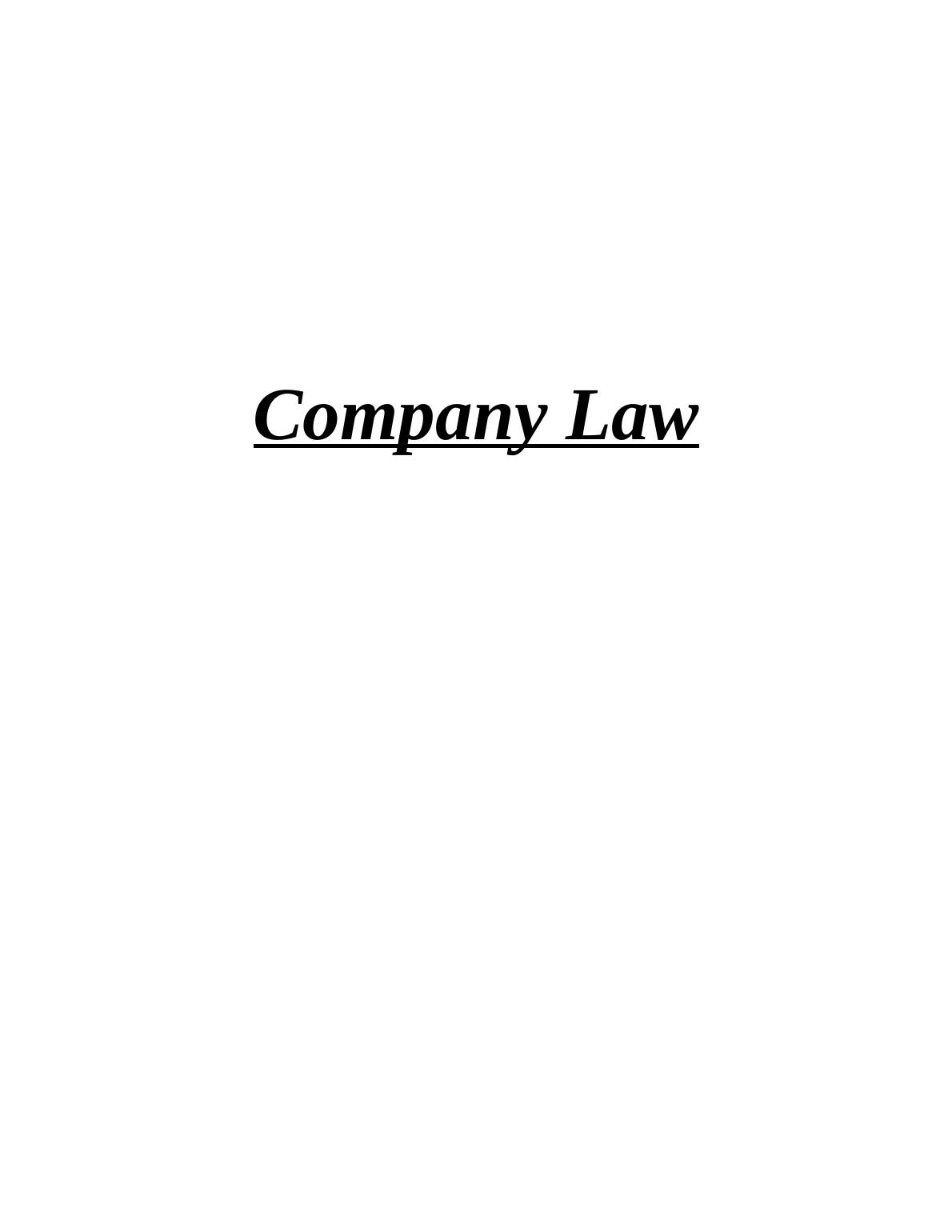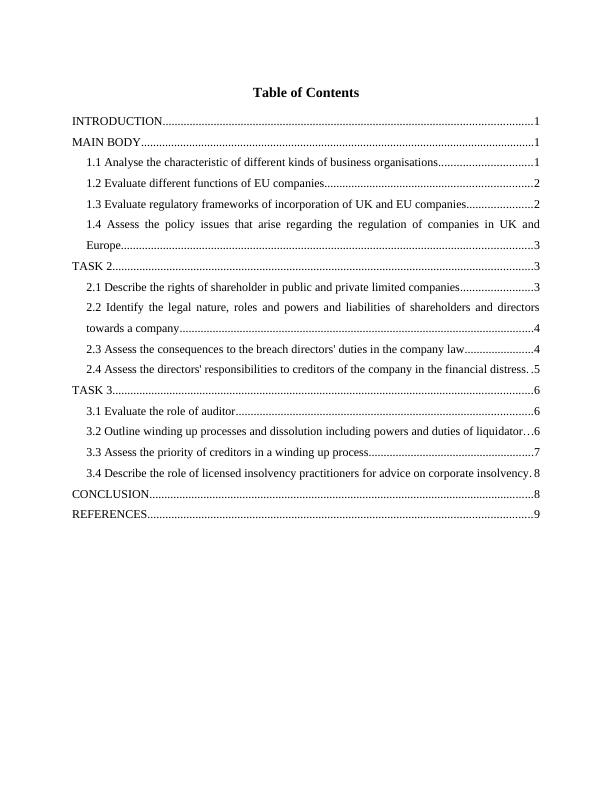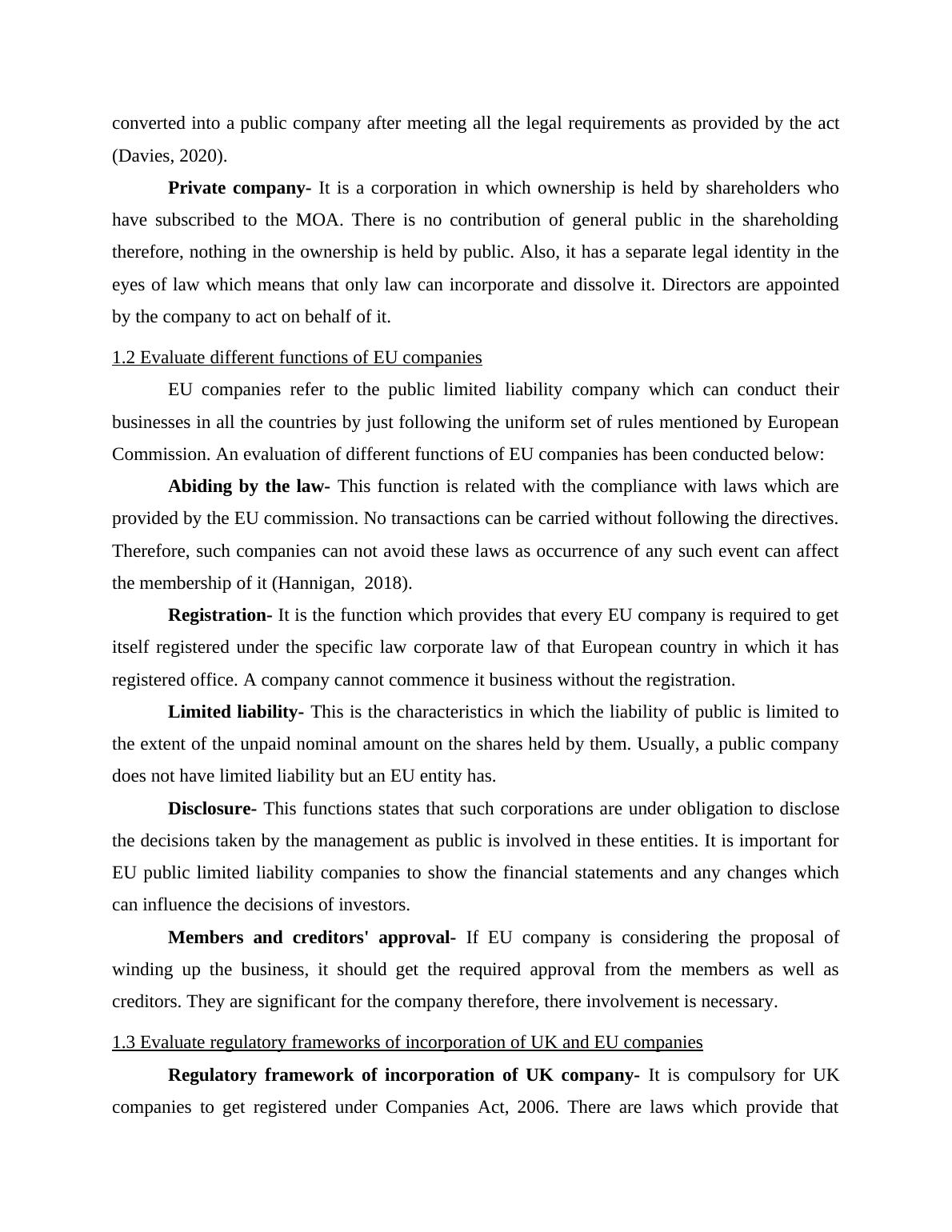Company Law: Characteristics, Functions, and Regulatory Frameworks
Added on 2023-01-13
12 Pages3823 Words96 Views
Company Law

Table of Contents
INTRODUCTION...........................................................................................................................1
MAIN BODY...................................................................................................................................1
1.1 Analyse the characteristic of different kinds of business organisations...............................1
1.2 Evaluate different functions of EU companies.....................................................................2
1.3 Evaluate regulatory frameworks of incorporation of UK and EU companies......................2
1.4 Assess the policy issues that arise regarding the regulation of companies in UK and
Europe.........................................................................................................................................3
TASK 2............................................................................................................................................3
2.1 Describe the rights of shareholder in public and private limited companies........................3
2.2 Identify the legal nature, roles and powers and liabilities of shareholders and directors
towards a company......................................................................................................................4
2.3 Assess the consequences to the breach directors' duties in the company law.......................4
2.4 Assess the directors' responsibilities to creditors of the company in the financial distress. .5
TASK 3............................................................................................................................................6
3.1 Evaluate the role of auditor...................................................................................................6
3.2 Outline winding up processes and dissolution including powers and duties of liquidator...6
3.3 Assess the priority of creditors in a winding up process.......................................................7
3.4 Describe the role of licensed insolvency practitioners for advice on corporate insolvency. 8
CONCLUSION................................................................................................................................8
REFERENCES................................................................................................................................9
INTRODUCTION...........................................................................................................................1
MAIN BODY...................................................................................................................................1
1.1 Analyse the characteristic of different kinds of business organisations...............................1
1.2 Evaluate different functions of EU companies.....................................................................2
1.3 Evaluate regulatory frameworks of incorporation of UK and EU companies......................2
1.4 Assess the policy issues that arise regarding the regulation of companies in UK and
Europe.........................................................................................................................................3
TASK 2............................................................................................................................................3
2.1 Describe the rights of shareholder in public and private limited companies........................3
2.2 Identify the legal nature, roles and powers and liabilities of shareholders and directors
towards a company......................................................................................................................4
2.3 Assess the consequences to the breach directors' duties in the company law.......................4
2.4 Assess the directors' responsibilities to creditors of the company in the financial distress. .5
TASK 3............................................................................................................................................6
3.1 Evaluate the role of auditor...................................................................................................6
3.2 Outline winding up processes and dissolution including powers and duties of liquidator...6
3.3 Assess the priority of creditors in a winding up process.......................................................7
3.4 Describe the role of licensed insolvency practitioners for advice on corporate insolvency. 8
CONCLUSION................................................................................................................................8
REFERENCES................................................................................................................................9

INTRODUCTION
Company law is that part of legal system in a country that contains provisions for
regulating the corporates. In UK, Companies Act, 2006 has been enacted for governing the
matters of entities (Cremers, 2017). This law includes the laws applicable from inception till the
winding up of the business. This file highlights the application of legal provisions by analysing
features of various type of business organisations, evaluation of different functions of EU
companies and regulatory frameworks of incorporation of UK and EU entities. Along with this,
assessment of policies, rights of shareholders in different types of companies, identification of
legal nature, roles etc. of directors, consequences of breach of director's duties, role of auditor,
winding up processes, assessment of priority of creditors and role of licensed insolvency
practitioners.
MAIN BODY
1.1 Analyse the characteristic of different kinds of business organisations
Sole trader- This business is owned and managed by a single individual who is called
proprietor. Law does not have any provision for registration as it does not allot any legal identity
to this form of business. Decision-making is done by the owner however, there can be additional
people for helping in the management of business. Further, it is determine that in sole
proprietorship there is less laws and regulations is formulated that occur less cost to the business
person. The sole trader take risk with an aim to earn profits. Moreover, occurrence of high loss in
sole proprietor company may leads to winding up of company. It is analysed that there is no
requirement to open a separate bank account for trading of transactions associated with business.
Partnership- It is an association of people having the same interest and directed towards
making profit. For this business type, there is no need to get it registered under any law. In other
words, it is optional so if the partners want they can register it in order to reduce conflicts in
future. The decisions taken by the partners. In addition to this, all the profits earned by business
company is divided in the partners equally or as per the written ration in partnership deed.
Public company- This type of company is the one in which the ownership is held by the
general public by subscribing to the shares of stock on exchanges or over the counter. It is
mandatory to get register under Companies Act, 2006. Furthermore, a private company can be
Company law is that part of legal system in a country that contains provisions for
regulating the corporates. In UK, Companies Act, 2006 has been enacted for governing the
matters of entities (Cremers, 2017). This law includes the laws applicable from inception till the
winding up of the business. This file highlights the application of legal provisions by analysing
features of various type of business organisations, evaluation of different functions of EU
companies and regulatory frameworks of incorporation of UK and EU entities. Along with this,
assessment of policies, rights of shareholders in different types of companies, identification of
legal nature, roles etc. of directors, consequences of breach of director's duties, role of auditor,
winding up processes, assessment of priority of creditors and role of licensed insolvency
practitioners.
MAIN BODY
1.1 Analyse the characteristic of different kinds of business organisations
Sole trader- This business is owned and managed by a single individual who is called
proprietor. Law does not have any provision for registration as it does not allot any legal identity
to this form of business. Decision-making is done by the owner however, there can be additional
people for helping in the management of business. Further, it is determine that in sole
proprietorship there is less laws and regulations is formulated that occur less cost to the business
person. The sole trader take risk with an aim to earn profits. Moreover, occurrence of high loss in
sole proprietor company may leads to winding up of company. It is analysed that there is no
requirement to open a separate bank account for trading of transactions associated with business.
Partnership- It is an association of people having the same interest and directed towards
making profit. For this business type, there is no need to get it registered under any law. In other
words, it is optional so if the partners want they can register it in order to reduce conflicts in
future. The decisions taken by the partners. In addition to this, all the profits earned by business
company is divided in the partners equally or as per the written ration in partnership deed.
Public company- This type of company is the one in which the ownership is held by the
general public by subscribing to the shares of stock on exchanges or over the counter. It is
mandatory to get register under Companies Act, 2006. Furthermore, a private company can be

converted into a public company after meeting all the legal requirements as provided by the act
(Davies, 2020).
Private company- It is a corporation in which ownership is held by shareholders who
have subscribed to the MOA. There is no contribution of general public in the shareholding
therefore, nothing in the ownership is held by public. Also, it has a separate legal identity in the
eyes of law which means that only law can incorporate and dissolve it. Directors are appointed
by the company to act on behalf of it.
1.2 Evaluate different functions of EU companies
EU companies refer to the public limited liability company which can conduct their
businesses in all the countries by just following the uniform set of rules mentioned by European
Commission. An evaluation of different functions of EU companies has been conducted below:
Abiding by the law- This function is related with the compliance with laws which are
provided by the EU commission. No transactions can be carried without following the directives.
Therefore, such companies can not avoid these laws as occurrence of any such event can affect
the membership of it (Hannigan, 2018).
Registration- It is the function which provides that every EU company is required to get
itself registered under the specific law corporate law of that European country in which it has
registered office. A company cannot commence it business without the registration.
Limited liability- This is the characteristics in which the liability of public is limited to
the extent of the unpaid nominal amount on the shares held by them. Usually, a public company
does not have limited liability but an EU entity has.
Disclosure- This functions states that such corporations are under obligation to disclose
the decisions taken by the management as public is involved in these entities. It is important for
EU public limited liability companies to show the financial statements and any changes which
can influence the decisions of investors.
Members and creditors' approval- If EU company is considering the proposal of
winding up the business, it should get the required approval from the members as well as
creditors. They are significant for the company therefore, there involvement is necessary.
1.3 Evaluate regulatory frameworks of incorporation of UK and EU companies
Regulatory framework of incorporation of UK company- It is compulsory for UK
companies to get registered under Companies Act, 2006. There are laws which provide that
(Davies, 2020).
Private company- It is a corporation in which ownership is held by shareholders who
have subscribed to the MOA. There is no contribution of general public in the shareholding
therefore, nothing in the ownership is held by public. Also, it has a separate legal identity in the
eyes of law which means that only law can incorporate and dissolve it. Directors are appointed
by the company to act on behalf of it.
1.2 Evaluate different functions of EU companies
EU companies refer to the public limited liability company which can conduct their
businesses in all the countries by just following the uniform set of rules mentioned by European
Commission. An evaluation of different functions of EU companies has been conducted below:
Abiding by the law- This function is related with the compliance with laws which are
provided by the EU commission. No transactions can be carried without following the directives.
Therefore, such companies can not avoid these laws as occurrence of any such event can affect
the membership of it (Hannigan, 2018).
Registration- It is the function which provides that every EU company is required to get
itself registered under the specific law corporate law of that European country in which it has
registered office. A company cannot commence it business without the registration.
Limited liability- This is the characteristics in which the liability of public is limited to
the extent of the unpaid nominal amount on the shares held by them. Usually, a public company
does not have limited liability but an EU entity has.
Disclosure- This functions states that such corporations are under obligation to disclose
the decisions taken by the management as public is involved in these entities. It is important for
EU public limited liability companies to show the financial statements and any changes which
can influence the decisions of investors.
Members and creditors' approval- If EU company is considering the proposal of
winding up the business, it should get the required approval from the members as well as
creditors. They are significant for the company therefore, there involvement is necessary.
1.3 Evaluate regulatory frameworks of incorporation of UK and EU companies
Regulatory framework of incorporation of UK company- It is compulsory for UK
companies to get registered under Companies Act, 2006. There are laws which provide that

End of preview
Want to access all the pages? Upload your documents or become a member.
Related Documents
Company Law: Characteristics, Functions, Regulatory Frameworks, and Policy Issueslg...
|12
|2775
|478
Nature and Management of Business Organizations in the UKlg...
|8
|2653
|429
Business Law: Legal Business Structure of UK Companieslg...
|8
|2468
|409
Key Sources of Laws for Business Organisations in the UKlg...
|8
|2458
|396
Corporate Law Study Material with Solved Assignments and Essayslg...
|11
|2200
|143
Key Sources of Laws for Business Organisations in the UKlg...
|8
|2560
|335
